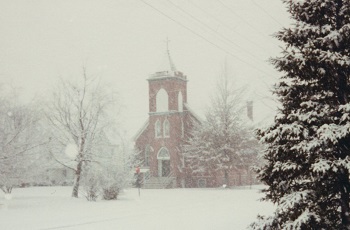Benediction
When I attended the Catholic Church as a child, I understood the essence of "benediction" even though I didn't know its definition. As a five-year-old, I could've told you that benediction was a separate time at the conclusion of Mass, right after communion. The priest and altar boys would disappear into a side room and the congregation would wait in a reverential hush except for whimpers from antsy toddlers and aimless knee-thumps on wooden pews. A few moments later, the priest would reappear in a fresh robe, followed by his attending altar boys. The talk of Christ's crucifixion was over. The offering had been collected. Holy Communion was done. Relief was at hand.

For a moment, the priest sat in a big, ornate chair in silence. Everything was finished, closed, at rest. The scent of candles, the hush of aftermath, and a broad sense of reflection and well-being filled the church. I waited in the pew, a little bored, wondering why we were watching a priest sit in a chair. Then, as if satisfied, the priest stood, lifted his right hand, and blessed the congregation to go out into the world to spread peace. It happened every Sunday. It was commonplace and a little tedious to me, but it was right and good, the way things should be.
Unlike Catholic Mass, most people don't experience benediction at the conclusion of life. Relatives and friends leave without saying goodbye, items are lost and never found, tragedy occurs without apparent reason, and longed-for blessings remain unrealized. We aren't privy to the answers that we desire even though we feel like wrestling them from stoic clouds. Even on the day of death when it seems as if we should be handed an explanation on a tally sheet, the answers are not offered. We are tempted to abandon our faith as if it was all an unfortunate hoax.
Why is there no benediction in life? Why no end-of-game score, no satisfying conclusion?
One day it dawned upon me that my perspective was as faulty as the ancients who presumed the Earth was the center of the solar system. Life on Earth is not my story; it's God's story. His story started long before I was born and it will end long after I die. My birth and my death occur somewhere in the midst of the Catholic mass—somewhere in the firelight of altar candles, in the raising of the chalice during the offertory, in the kneeling on padded benches during reflection on Christ's crucifixion. If I experience any benediction in life, it's intermittent. Sacrifice crashes in again, the offertory resumes, and I must drop to my knees again. There's no clean exit, no changing of robes, no respite on a large, ornate chair.
The High Priest, our divine Father, will not rest until Jesus returns to Earth, until Satan is vanquished, until prophecy is fulfilled. Today, the mass is still in progress.
As a child, I understood benediction better than I do now. I was sheltered by my parents' love, unacquainted with loose ends, untouched by disease and death and fractured relationships. As I reflect upon those long-ago, innocent years in the hushed church, I sense peace again in a way that a child trusts without question, without wounds—in a way that a child's eyes brighten at the dancing candlelight and the donning of colorful robes.
Perhaps we are most profound as children. Only after decades of chasing ambitions do we realize that we already had the best before we ever struck forth on life's adventures. The innocence of a child embraces the attributes we struggle to regain later: simplicity, purity, trust, and open-armed love.
When I remember through my child eyes, I once again trust that the High Priest will reappear in a new robe, that I will rest, and that He will bless me. Disappointment vanishes, the clarity of childhood returns, and I once again trust that benediction will be worth the wait.
For now we see through a glass, darkly; but then face to face: now I know in part; but then shall I know even as also I am known. (1 Corinthians 13:12 KJV)